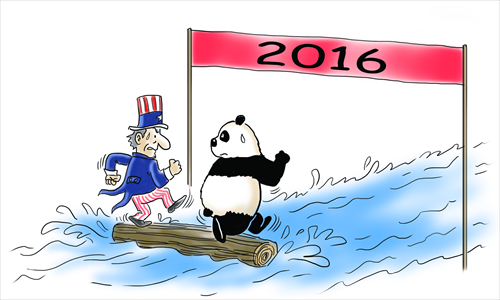Managing differences remains the main focus of Sino-US ties

Illustration: Liu Rui/GT
Buoyed by the September US-China summit, a cyber accord, and China's pivotal role in reaching an agreement at the Paris climate talks, US-China relations approach 2016 with a bit of momentum, but there is still an arduous path ahead.
Both sides seek a "steady as she goes" holding pattern for the remaining year of US President Barack Obama's tenure. But a host of thorny economic and geopolitical issues will be difficult for both Washington and Beijing to navigate.
All the issues will be amplified by the white noise of loud, crass, and heated rhetoric of the 2016 US presidential election campaign. China tends to be a convenient punching bag for candidates to show how "tough" they are.
One frequent US complaint is the value of the yuan. Though the yuan has appreciated by 30 percent against the dollar since 2008, many in Congress still believe that it is overvalued.
Beijing's announcement that it will end its loose peg to the dollar and instead peg the yuan to a basket of currencies makes sense at a time when the dollar is strengthening after the US Federal Reserve raised interest rates and China is seeking to let the market play a larger role in determining the value of the yuan. Though the US supports that goal, the reality is that this shift is likely to see a weakening of the yuan against the dollar. If so, that will again lead to tension in US-China relations.
The Taiwan question could also become a renewed source of friction. Against the backdrop of a US arms sales to Taiwan that angered Beijing, Taiwan will be holding elections in January. A widely expected victory by the opposition Democratic Progressive Party (DPP) is likely to open a new and uncertain chapter in cross-Straits relations.
Strengthening confidence-building measures and military-to-military ties will be important as tensions are likely to persist in the South China Sea. If an international court rules against China's territorial claims in the disputed Nansha Islands, the issue may get hotter. Some Association of Southeast Asian Nations (ASEAN) claimants may follow the Philippines and file a legal suit. China rejects the court's jurisdiction, and sees the islands as a sovereignty issue, while the US sees it as an international rule of law issue, though it has no claims in the region. US "freedom of navigation" exercises near islands controlled by China have been strongly opposed by Beijing.
In recent months, Beijing has stabilized its ties with both the Philippines and Vietnam. Progress on a code of conduct in regard to the South China Sea, which China has expressed interest in, could reduce tensions and lower its profile in US-China relations as well.
Two important opportunities to reinforce the Sino-US relationship are growing cooperation on climate change, and progress on the Bilateral Investment Treaty (BIT). US climate negotiator Todd Stern recently said "there is no country we cooperate more with than China."
For US businesses, which have been a pillar of support for the bilateral relationship, reducing so-called "negative lists" of areas excluded from the BIT is key to a robust treaty that would strengthen economic ties and make it easier for both US and Chinese firms to do business in each other's markets. Demonstrating progress on a BIT in 2016 will be important. A dialogue on the Trans-Pacific Partnership and a clear message from the US that China is welcome to join it in the future would also bolster the relationship.
Another interesting opportunity in 2016 may be enhanced cooperation in the Middle East. If Beijing's recent decision to host a meeting of the Syrian opposition is an indicator of a more active Chinese role in ending the turmoil and destroying IS terrorism, then a new phase of Sino-US cooperation in the region would reinforce Sino-US ties.
All this occurs at a time when there has been growing debate in the US about whether the approach to China that has been pursued by eight US presidents from Nixon to Obama should be reconsidered.
So far, no alternative to a policy of cooperating where possible, and managing differences is evident. However, which issues Washington and Beijing put in each of those baskets may be changing. In any case, 2016 will close the current chapter, and 2017 will open a new one, as China considers how to respond to a new US president.
The author is a senior fellow with the Brent Scowcroft Center for International Security at the Atlantic Council. opinion@globaltimes.com.cn